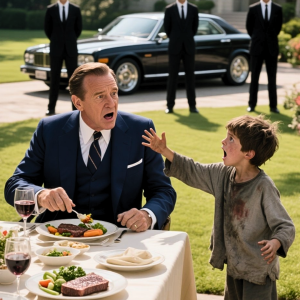
“Stay where you are. Don’t make a sound. You are not safe.”
The words cut through the quiet night like a sharp blade. Lucien Vale, CEO of ValeTech Enterprises, froze mid-step. Moments ago, he had been walking toward the rear entrance of the St. James Hotel, trying to slip past the cluster of paparazzi outside. Now, a young woman, her clothes worn and threadbare, her hair matted and streaked with dirt, pulled him into the alley behind the building.
Before he could speak, she pressed her lips to his. The world seemed to stop. The smell of wet pavement, the distant hum of late-night traffic, the cold wind brushing against their faces, all dissolved into silence. Then, a sleek black car roared past the alley, its windows darkened, headlights cutting through the darkness. A figure leaned out of the driver’s side, scanning the street. Lucien’s heartbeat slammed against his ribs. Someone had been looking for him.
The young woman pulled back slightly. “You are safe for now,” she whispered. “If you had looked up, they would have recognized you immediately.”
Lucien blinked in disbelief. “Who are you?”
“It does not matter,” she replied, retreating a step. “You should never walk alone in the city at night.”
Something in her calm, unwavering voice made him stay, even as his mind raced. “You knew they were following me?”
“I notice patterns,” she said simply. “When you sleep on the streets, you learn to see what others miss before moving a muscle.”
Her name, he later learned, was Mara Quinn. She had been homeless for two years, surviving nights in abandoned subway stations and under bridges, observing the city in ways he never had. That night, she had saved the life of one of the wealthiest men in Manhattan.
Lucien could not ignore her. He tracked her three days later, finding her outside a modest soup kitchen, her small frame hunched over a steaming bowl. Her gray eyes met his instantly, wary and sharp.
“I told you not to follow me,” she said flatly.
“You saved my life,” he replied. “I must at least thank you.”
She shook her head. “People like you give to feel better about themselves. I want nothing of it.”
“Then work with me,” Lucien said, surprising himself with the firmness in his voice. “I need someone who notices what most people cannot.”
Her laugh was brief, sharp, humorless. “You want to hire a girl who sleeps on the streets?”
“Yes,” he answered. “I want your instincts on my team.”

Eventually, Mara agreed to a temporary security position. His staff had doubts at first. A young woman with no formal background, no address, and no college degree did not belong in corporate security. Yet she had an instinctual clarity, a sixth sense about threats that no technology or training could replicate.
Lucien quickly realized that Mara was not merely protecting him. She was opening his eyes to the world outside his glass towers, showing him the humanity he had ignored. “You live behind walls of wealth,” she once told him. “People are visible to you, but you rarely see them.”
As the weeks passed, their interactions became quieter, more personal. Late-night coffee in his office, brief smiles across polished marble floors, laughter shared over banal jokes, and moments of silence where words were unnecessary. Mara never flirted, yet every time she smiled, Lucien felt the weight of his power fade into insignificance.
Then came another night of danger. The same black sedan returned, but this time Mara was the target. A gunshot rang out, intended for Lucien, and she stepped forward instinctively. The bullet struck her shoulder, tearing through the fabric of her jacket.
Security restrained the shooter in an instant, but all Lucien could see was Mara collapsing to the floor, crimson spreading across her sleeve. “Stay with me,” he whispered, pressing his hand against the wound. Her eyes fluttered open, calm yet defiant. “I still have a talent for trouble,” she murmured with a weak smirk.
Hours in the hospital passed slowly, the fluorescent lights humming above them. Lucien watched as doctors worked, replaying in his mind her words about the walls he had built around himself. She had not only saved his life that night, but she had reminded him that connection required vulnerability.
When Mara awoke, she teased him, “You cannot just pay me back by staring at me all day.”
“I am not trying to pay you back,” Lucien said. “I am trying to honor what you have done for me.”
Over the following months, he arranged a small apartment for her, set up a fund for her continuing education, and ensured she had a fresh start. It was not charity, nor a favor, but a recognition of the clarity she brought to his life, the courage that broke through his armor.
One crisp afternoon, they walked through Madison Square Park, amber leaves falling around them. Mara glanced at him. “You could have stayed in your penthouse, untouched by the world. Why didn’t you?”
Lucien smiled gently. “Because sometimes the person who saves you does not just remove you from danger. They pull you out of the life you hide behind.”
In that moment, he understood that wealth and power were meaningless when faced with true courage. Mara had shown him what it meant to see, to feel, and to live fully again.




